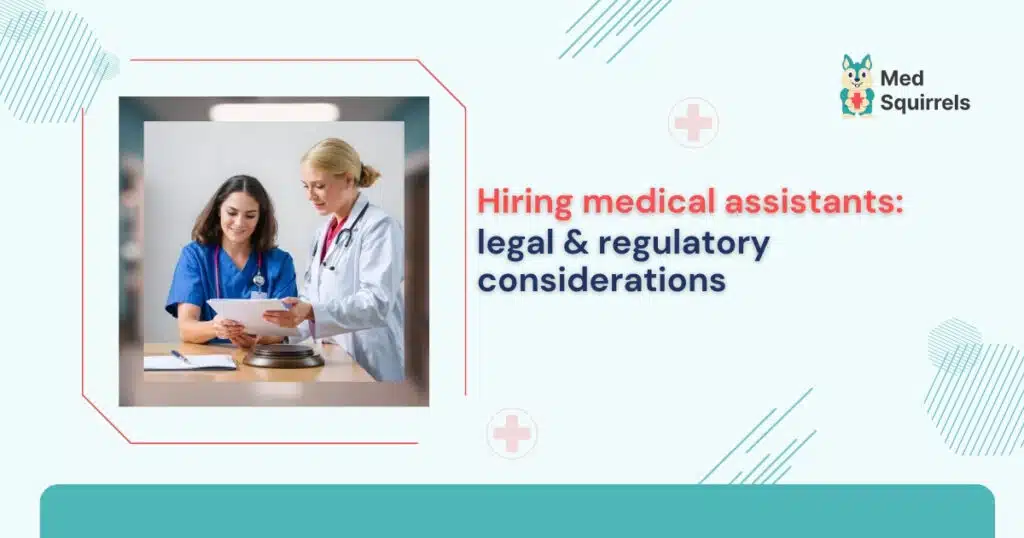Hiring medical assistants: legal and regulatory considerations

Even though the scope of practice of medical assistants varies from state to state, the primary duties of a medical assistant revolve around clinical tasks and administrative duties. Due to the complex nature of the medical assistant job, which demands both technical expertise and non-technical skills, there is a substantial gap in meeting the existing staff demands. As facilities strive to find and hire medical assistants, little attention might be put to compliance verification and credentialing, which can lead to regulatory issues in the long run.
To avoid these regulatory risks, facilities must devise a well-structured approach for interviewing and onboarding candidates by adhering to the legal and regulatory considerations detailed by the state where their facility is located. This blog delves into the various legal and regulatory issues that may arise from medical assistant hiring and how they can be solved efficiently.
Why is proper credentialing essential when hiring medical assistants?
Credentialing and compliance checks are important factors in medical assistant hiring. Failing to adhere to federal or state regulatory norms can lead to serious legal concerns. Legal and regulatory considerations are essential to ensure all hiring practices comply with applicable laws and standards. Credentialing encompasses all the background verification and credential checks of the potential candidate to see that the candidate’s qualifications, skillsets, experience, and traits are fit to work as a medical assistant in a healthcare setting. This process ensures minimal occurrence of errors by professionals, leading to optimal patient care. When hiring medical assistants, background verification also helps identify any pending criminal or drug abuse records, which can put the patient’s safety at risk.
Compliance checks constitute detailed verification to ensure that the candidate fulfills all the regulatory guidelines implemented by the state to work as a medical assistant at your facility. The state monitors these regulatory guidelines, and failure to adhere to these can lead to serious legal complications and reputational damage to your facility. Some states require medical assistants to pass a licensure examination, which might include questions to check the candidate’s safety standards and legal understanding. These licenses are subject to renewal at regular intervals to ensure that the medical assistants practicing in the state are updated on the latest medical trends and guidelines. For most states, continuing education is the mandate for license renewal.
All these compliance checks of the hiring process and credentialing have to be strictly followed by the facilities as well as the medical assistants so there won’t be any future legal complications. In addition, credentialing ensures that patients receive proper treatment from skilled professionals who follow safety standards with minimum errors. Healthcare facility assurance of high care standards and operational efficiency will further be upheld through the upholding of a high professional reputation in respect to credentialing.
What are the key legal and regulatory considerations in hiring medical assistants?
The compliance verification and credentialing behind the onboarding process are burdensome and require the utmost care. When you hire medical assistants, keep note of legal and regulatory considerations that may arise and strategies to mitigate them effectively.
Certification and educational qualification requirements
Medical assistants must complete a post-secondary program or on-the-job training from an accredited institution to practice in healthcare settings. Some states require them to be certified or licensed to practice in the state as medical assistants. Hence, it is essential to understand the state-specific requirements and general educational qualifications necessary to become a certified medical assistant.
License requirements
When a license is mandated in your state, it requires frequent renewal by completing continuing education requirements. Always check with your state licensing agency to understand the criteria, timeline, and policies regarding the medical assistant license and its renewal. Also, verify that the medical assistant’s license was recently renewed.
Credentialing and background checks
A thorough background check is essential to ensure the candidate has no pending criminal or drug usage records. You can ask the candidate for a reference letter from previous employers to validate the medical assistant credentialing process further. It is also essential to verify the authenticity of every certification produced by the candidate.
Adherence to employment laws
There are various employee welfare acts governing aspects such as fair labor pay, diversity and equity policies, wages, and overtime allowances to protect workplace safety and employee wellness for medical professionals. Additionally, be aware of the “ban the box” policy in your state, if any, which states that you cannot ask for criminal history in the job application. This needs to be checked later on after the interview process to ensure that even candidates with prior criminal backgrounds have a fair opportunity for the job. Thus, understanding and comprehending these guidelines while crafting job descriptions is essential for hiring medical assistants.
Employment contract and policies
While recruiting medical assistants, frame proper employment contracts and policies that define the terms of employment, including duties, compensation, benefits, and termination policies. You can relieve these contractual documentation tasks when you hire medical assistants from experienced staffing agencies, who act as the employer of record (EOR) and take care of all staffing formalities, including payrolling.
Orientation and safety standard training
Even if medical assistants are experienced enough to work in healthcare settings, design training programs that provide them with proper orientation on safety standards and other ethical guidelines specific to your facility. Training medical assistants to work in your facility’s unique environment can be an added advantage in the long run.
Essential background checks to hire Medical Assistants
When you hire medical assistants, it is essential to balance security and fairness. Safeguarding a compliant environment while laying down equitable policies for the staff is crucial. Here are some background check best practices to balance security and fairness while hiring medical assistants.
- Provide a detailed explanation of the job description of a medical assistant in your facility at the time of the interview.
- Give a clear picture of the interview procedure, credentialing, and compliance requirements to the candidate.
- Get written consent from the potential candidate before you initialize the background check and credentialing process.
- Ask the candidate for references from previous employers to facilitate medical assistant credentialing.
- Have a standardized process of background verification that ensures that all the candidates who applied for the same position undergo the same process.
- Provide the findings of your background verification and give a chance for the candidate to explain any inaccuracy in the findings that caused disqualifying them.
- Have thorough documentation of the credentialing process to support fairness and defend against any potential legal claims.
- Secure the candidate data collected confidentially and limit access to the background check documents to authorized personnel only.
Creating an effective Medical Assistant onboarding program
To create an effective medical assistant onboarding program, facilities have to prepare well in advance to curate a structured onboarding and orientation process. A proper orientation needs to be provided to the onboarded candidates on their technical duties, facility values, administrative tasks, safety standards, and patient handling to mitigate all potential risks. During the initial days of employment, the newly hired medical assistants can be assigned to work with other experienced professionals who can mentor the newly recruited medical assistants. A good practice would be to monitor the performance of the onboarded medical assistants at regular intervals and provide them with feedback for improvement. With these strategies, facilities can curate an effective medical assistant onboarding program that provides a seamless experience.
Hire medical assistants: ensure 100% compliance via MedSquirrels staffing platform
Legal and regulatory issues are crucial in healthcare staffing as the field demands adequately trained and fit staff to care for the patients. Thus, it is vital to ensure that patient safety is a primary concern when hiring medical assistants while also ensuring a safe working environment for them. Effectively streamlining all the fluctuating regulatory guidelines and ensuring proper documentation while hiring a resource can be challenging as this process demands both money and effort from the administrative team. The best way to hire medical assistants would be to get help from a medical assistant staffing solutions provider like MedSquirrels, which can navigate through all your facility’s staffing demands by ensuring 100% proper credentialing and accurate compliance checks.
MedSquirrels is a well-reputed and experienced medical staffing solutions platform leveraging technology to ensure all the processes associated with staff onboarding, credentialing, compliance checks, etc, are accurately done and managed hassle-free. MedSquirrels also has an experienced team of recruiters to cross-check and validate each stage of the medical assistant hiring process, relieving you of potential compliance risks in the future. MedSquirrels’ EOR functionality is one of the most sought-after features based on a flat license fee model to eliminate the huge markup fee that facilities have to pay to middlemen. You can book a demo today to learn more about MedSquirrels’ staffing platform and how it can help you hire medical assistants.
FAQs:
What are those key legal and regulatory considerations when hiring medical assistants?
When hiring medical assistants, employers must ensure compliance with state and federal regulations regarding certification, training, and licensing. This includes understanding the specific medical assistant certification requirements in their state and ensuring that candidates have completed accredited medical assistant training programs.
What certifications are required for medical assistants?
Medical assistants may hold various certifications, such as Certified Medical Assistant (CMA) or Registered Medical Assistant (RMA). Employers should verify that candidates have the appropriate medical assistant certification from recognized organizations, as this demonstrates their qualifications and commitment to the profession.
Do we have any specific training programs that medical assistants must complete?
Yes, candidates typically must complete an accredited medical assistant training program to be eligible for certification. These programs provide essential skills in both clinical and administrative tasks necessary for effective performance in healthcare settings.
What medical assistant license requirements are needed for the USA?
While most states do not require medical assistants to be licensed, Washington is an exception where a medical assistant license is mandatory. Employers should verify the licensing requirements specific to their state and ensure that candidates meet these standards.
How often do medical assistant certifications need to be renewed?
Most certifications require renewal every few years, contingent upon completing continuing education requirements. Employers should ensure that their hired medical assistants maintain current medical assistant certification to comply with industry standards.
Jani Basha is a healthcare content expert at MedSquirrels, sharing insights on staffing trends, hiring best practices, and career growth.
